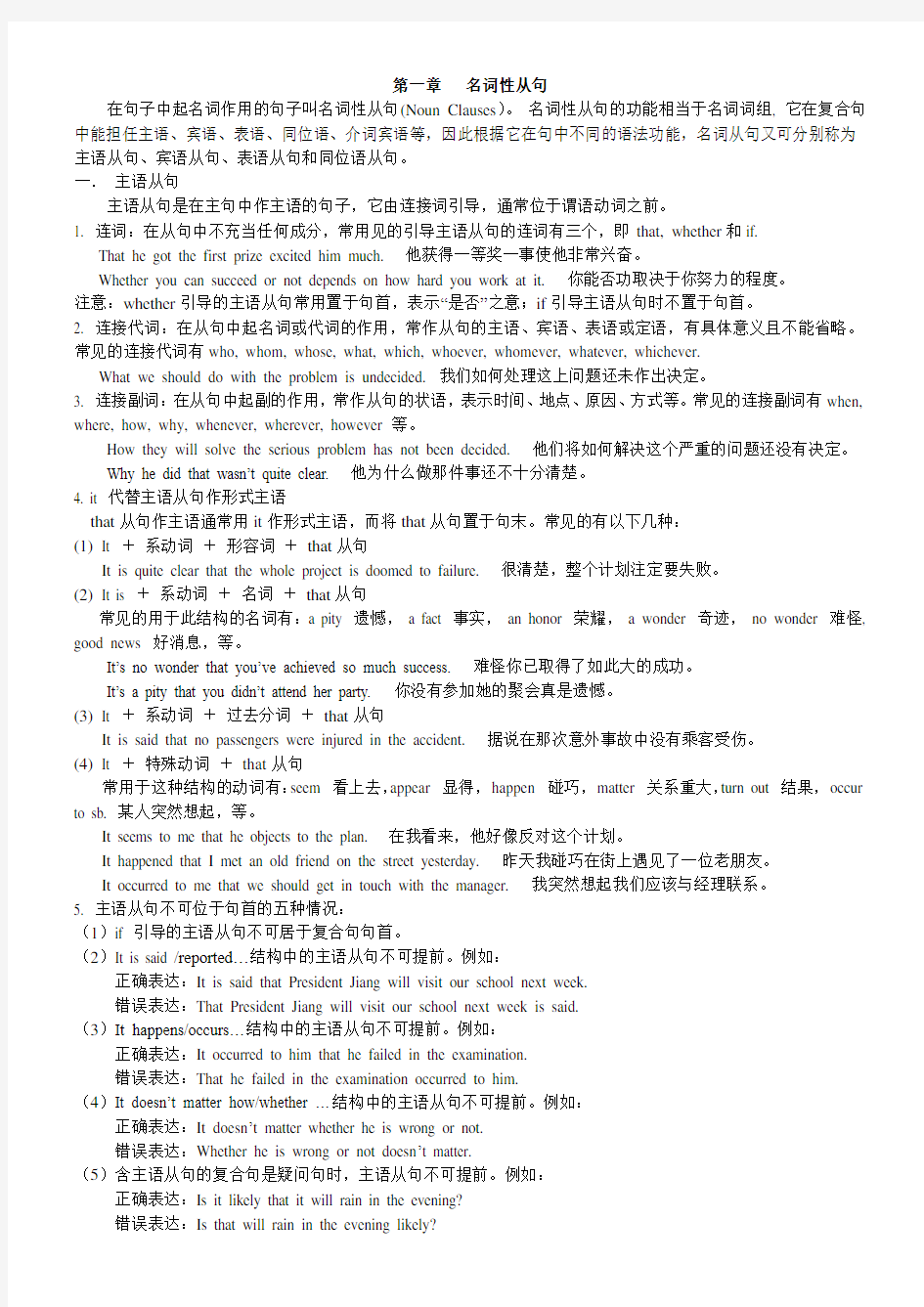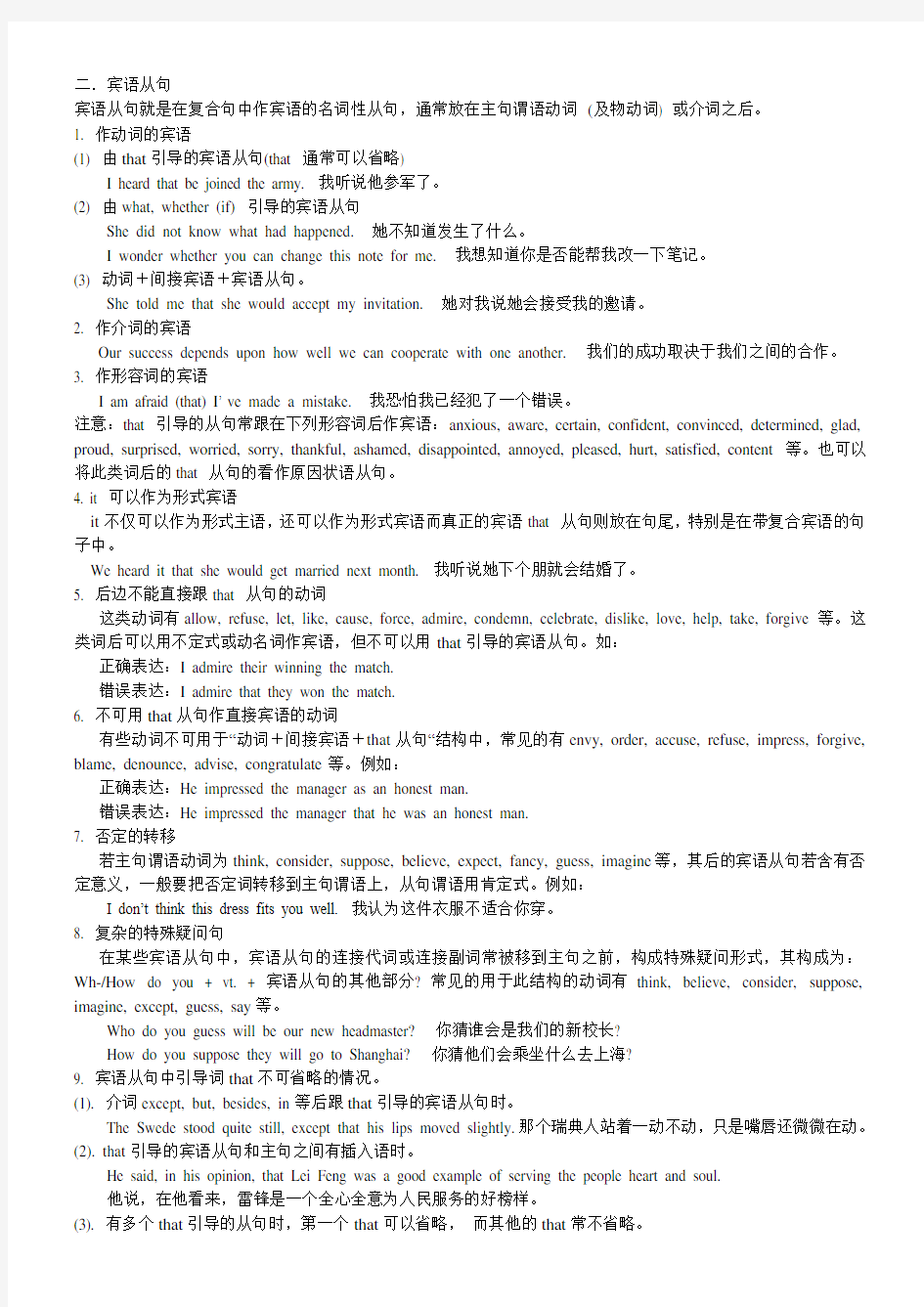(完整版)高中名词性从句精讲及练习


第一章名词性从句
在句子中起名词作用的句子叫名词性从句(Noun Clauses)。名词性从句的功能相当于名词词组, 它在复合句中能担任主语、宾语、表语、同位语、介词宾语等,因此根据它在句中不同的语法功能,名词从句又可分别称为主语从句、宾语从句、表语从句和同位语从句。
一.主语从句
主语从句是在主句中作主语的句子,它由连接词引导,通常位于谓语动词之前。
1. 连词:在从句中不充当任何成分,常用见的引导主语从句的连词有三个,即that, whether和if.
That he got the first prize excited him much. 他获得一等奖一事使他非常兴奋。
Whether you can succeed or not depends on how hard you work at it. 你能否功取决于你努力的程度。
注意:whether引导的主语从句常用置于句首,表示“是否”之意;if引导主语从句时不置于句首。
2. 连接代词:在从句中起名词或代词的作用,常作从句的主语、宾语、表语或定语,有具体意义且不能省略。常见的连接代词有who, whom, whose, what, which, whoever, whomever, whatever, whichever.
What we should do with the problem is undecided. 我们如何处理这上问题还未作出决定。
3. 连接副词:在从句中起副的作用,常作从句的状语,表示时间、地点、原因、方式等。常见的连接副词有when, where, how, why, whenever, wherever, however等。
How they will solve the serious problem has not been decided. 他们将如何解决这个严重的问题还没有决定。
Why he did that wasn’t quite clear. 他为什么做那件事还不十分清楚。
4. it 代替主语从句作形式主语
that从句作主语通常用it作形式主语,而将that从句置于句末。常见的有以下几种:
(1)It +系动词+形容词+that从句
It is quite clear that the whole project is doomed to failure. 很清楚,整个计划注定要失败。
(2)It is +系动词+名词+that从句
常见的用于此结构的名词有:a pity 遗憾,a fact 事实,an honor 荣耀,a wonder 奇迹,no wonder 难怪, good news 好消息,等。
It’s no wonder that you’ve achieved so much success. 难怪你已取得了如此大的成功。
It’s a pity that you didn’t attend her party. 你没有参加她的聚会真是遗憾。
(3)It +系动词+过去分词+that从句
It is said that no passengers were injured in the accident. 据说在那次意外事故中没有乘客受伤。
(4)It +特殊动词+that从句
常用于这种结构的动词有:seem 看上去,appear 显得,happen 碰巧,matter 关系重大,turn out 结果,occur to sb. 某人突然想起,等。
It seems to me that he objects to the plan. 在我看来,他好像反对这个计划。
It happened that I met an old friend on the street yesterday. 昨天我碰巧在街上遇见了一位老朋友。
It occurred to me that we should get in touch with the manager. 我突然想起我们应该与经理联系。
5. 主语从句不可位于句首的五种情况:
(1)if 引导的主语从句不可居于复合句句首。
(2)It is said /reported…结构中的主语从句不可提前。例如:
正确表达:It is said that President Jiang will visit our school next week.
错误表达:That President Jiang will visit our school next week is said.
(3)It happens/occurs…结构中的主语从句不可提前。例如:
正确表达:It occurred to him that he failed in the examination.
错误表达:That he failed in the examination occurred to him.
(4)It doesn’t matter how/whether …结构中的主语从句不可提前。例如:
正确表达:It doesn’t matter whether he is wrong or not.
错误表达:Whether he is wrong or not doesn’t matter.
(5)含主语从句的复合句是疑问句时,主语从句不可提前。例如:
正确表达:Is it likely that it will rain in the evening?
错误表达:Is that will rain in the evening likely?
二.宾语从句
宾语从句就是在复合句中作宾语的名词性从句,通常放在主句谓语动词(及物动词) 或介词之后。
1. 作动词的宾语
(1) 由that引导的宾语从句(that 通常可以省略)
I heard that be joined the army. 我听说他参军了。
(2) 由what, whether (if) 引导的宾语从句
She did not know what had happened.她不知道发生了什么。
I wonder whether you can change this note for me.我想知道你是否能帮我改一下笔记。
(3) 动词+间接宾语+宾语从句。
She told me that she would accept my invitation.她对我说她会接受我的邀请。
2. 作介词的宾语
Our success depends upon how well we can cooperate with one another.我们的成功取决于我们之间的合作。
3. 作形容词的宾语
I am afraid (that) I’ ve made a mistake.我恐怕我已经犯了一个错误。
注意:that 引导的从句常跟在下列形容词后作宾语:anxious, aware, certain, confident, convinced, determined, glad, proud, surprised, worried, sorry, thankful, ashamed, disappointed, annoyed, pleased, hurt, satisfied, content 等。也可以将此类词后的that 从句的看作原因状语从句。
4. it 可以作为形式宾语
it不仅可以作为形式主语,还可以作为形式宾语而真正的宾语that 从句则放在句尾,特别是在带复合宾语的句子中。
We heard it that she would get married next month. 我听说她下个朋就会结婚了。
5. 后边不能直接跟that 从句的动词
这类动词有allow, refuse, let, like, cause, force, admire, condemn, celebrate, dislike, love, help, take, forgive等。这类词后可以用不定式或动名词作宾语,但不可以用that引导的宾语从句。如:
正确表达:I admire their winning the match.
错误表达:I admire that they won the match.
6. 不可用that从句作直接宾语的动词
有些动词不可用于“动词+间接宾语+that从句“结构中,常见的有envy, order, accuse, refuse, impress, forgive, blame, denounce, advise, congratulate等。例如:
正确表达:He impressed the manager as an honest man.
错误表达:He impressed the manager that he was an honest man.
7. 否定的转移
若主句谓语动词为think, consider, suppose, believe, expect, fancy, guess, imagine等,其后的宾语从句若含有否定意义,一般要把否定词转移到主句谓语上,从句谓语用肯定式。例如:
I don’t think this dress fits you well. 我认为这件衣服不适合你穿。
8. 复杂的特殊疑问句
在某些宾语从句中,宾语从句的连接代词或连接副词常被移到主句之前,构成特殊疑问形式,其构成为:Wh-/How do you + vt. + 宾语从句的其他部分? 常见的用于此结构的动词有think, believe, consider, suppose, imagine, except, guess, say等。
Who do you guess will be our new headmaster? 你猜谁会是我们的新校长?
How do you suppose they will go to Shanghai? 你猜他们会乘坐什么去上海?
9. 宾语从句中引导词that不可省略的情况。
(1). 介词except, but, besides, in等后跟that引导的宾语从句时。
The Swede stood quite still, except that his lips moved slightly.那个瑞典人站着一动不动,只是嘴唇还微微在动。
(2). that引导的宾语从句和主句之间有插入语时。
He said, in his opinion, that Lei Feng was a good example of serving the people heart and soul.
他说,在他看来,雷锋是一个全心全意为人民服务的好榜样。
(3). 有多个that引导的从句时,第一个that可以省略,而其他的that常不省略。
I think (that) it will clear up this afternoon and that they will come to say goodbye to us.
我认为今天下午会放晴,他们会来向我们告别的。
(4). 当when, who, what, where, why, how等引导的从句与that引导的从句作主句谓语动词的并列宾语时。
I’m sure where he lives and that he is living a happy life. 我非常清楚他住在什么地方,而且他生活得很幸福。
三. 表语从句
表语从句在复合句中作表语的从句,放在be, look, seem等系动词后。常用见的引导表语从句的连接词有that, whether, wh-词,as, as if/though, because等。
1. that, whether引导表语从句
that, whether引导表语从句时只起连接作用,不作任何成分;that无实义,whether意为“是否”。
2. wh-词和because引导的表语从句。
wh-词包括连接代词who, whom, whose, what, which, whoever, whatever, whichever和连接副when, where, why, wherever, whenever等,此类词大多表示疑问意义,偶尔表示陈述意义。Because引导的表语从句表示陈述意义。The question is how we can persuade him to go. 问题是我们如何才能说服他去。
That’s because he didn’t understand me. 那是因为他不理解我。
3. as, as if, as though引导的表语从句
此类表语从句常用跟在特定动词后面,如seem, appear, look, taste, sound, feel等。
I feel as though the house is shaking. 我感到好像房子在晃动。
4. reason作主语时的表语从句
reason作主语时,其表语从句需用that引导,一般不用why或because引导。
The reason for the car accident is that the driver was drunk. 这次交通事故是司机酒后驾驶导致的。
四. 同位语从句
同位语从句是用以解释说明某一名词内容的从句。所以它总是跟在某一个名词的后面。该名词被称作先行词。1. 同位语从句的连接词
同位语从句的连接词主要有that, whether, why, who, where, how, when等。在同位语从句中that, whether不作成分,that无实际意义,whether表示“是否”;其他连接词具有实义,同时在同位语从句中作一定成分。引导同位语从句的连接词一般都不省略。
The report that he was going to resign was false. 他将辞职的报道是假的。
There’s some doubt whether John will come on time. 对约翰是否会准时到还有一些怀疑。
2. 可跟同位语从句的名词
不是所有的名词都可以跟同位语从句,常可以被同位语从句修饰的名词有:
advice 建议belief 信念fact 事实hope 希望idea 主意news 消息opinion 观点order 命令promise 诺言question 问题reply 答复report 报道thought 想法truth 事实warning 警告
The problem why the earth is becoming warmer and warmer is still under discussion.
地球为什么变得越来越暧这一问题仍在讨论之中。
3. 同位语在句子中的位置
同位语从句有时可以不紧跟在它所说明的名词后面,而是被别的词隔开。
He got the news from Mary that the sports meeting was put off. 他从玛丽那里获知了运动会被推迟的消息。
4. 同位语从句与定语从句的区别
(1) 定语从句中的that既代替先行词,同时以在从句中作某个成分(主语或宾语),而同位语从句中的that是连词,只起连接主句与从句的作用,不充当句中任何成分。
(2) 定语从句是形容词性的,其功能是修饰先行词,对先行词加以限定,描述定的性质或特征;同位语从句是名词性的,其功能是对名词进行补充说明。
1) The news that he told me is that Tom would go abroad next year.(他告诉我的消息是汤姆明年将出国。)
(第一个that引导的从句是定语从句,that在从句中作宾语)
2)The news that Tom would go abroad is told by him.(汤姆将出国的消息是他讲的。)
(同位语从句,that在句中不作任何成分)
名词性从句练习
一. 选择题
1. _____ some people regard as a drawback is seen as a plus by many others.
A. Whether
B. What
C. That
D. How
2. How much one enjoys himself travelling depends largely on ____ he goes with, whether his friends or relatives.
A. what
B. who
C. how
D. why
3. Before the sales start, I make a list of ____ my kids will need for the coming season.
A. why
B. what
C. how
D. which
4. Part of the reason Charles Dickens loved his own novel, David Copperfield, was ____ is was rather closely modeled on his own life.
A. what
B. that
C. why
D. whether
5. It never occurred to me ____ you could succeed in persuading him to change his mind.
A. which
B. what
C. that
D. if
6. As a new graduate, he doesn’t know ____ it takes to start a business here.
A. how
B. what
C. when
D. which
7. One reason for her preference for city life is ____ she can have easy access to places like shops and restaurants.
A. that
B. how
C. what
D. why
8. I want to be liked and loved for ____ I am inside.
A. who
B. where
C. what
D. how
9. -I prefer shutting myself in and listening to music all day on Sundays.
-That’s ____ I don’t ag ree. You should have a more active life.
A. where
B. how
C. when
D. what
10. We should respect food and think about the people who don’t have ____ we have here and treat food nicely.
A. that
B. which
C. what
D. whether
11. -Have you finished the book?
-No, I’ve read up to ____ the children discover the secret cave.
A. which
B. what
C. hat
D. where
12. Cindy shut the door heavily and burst into tears. No one in the office knew ____ she was so angry.
A. where
B. whether
C. that
D. why
13. When changing lanes, a driver should use his turning signal to let other drivers know ____.
A. he is entering which lane
B. which lane he is entering
C. is he entering which lane
D. which lane is he entering
14. We haven’t discussed yet ____ we are going to place our new furniture.
A. that
B. which
C. what
D. where
15. -It’s no use having ideas only.
-Don’t worry. Peter can show you ____ to turn an idea into an act.
A. how
B. who
C. what
D. where
16. The professor tried to show us through his experiment ______ from books can be used in practice.
A. that we have learned
B. how that we have learned
C. how what we have learned
D. that how we have learned
17. It leaves me in no doubt ____ scientists will come up with new ways to increase the world’s food supply.
A. when
B. where
C. that
D. if
18. It is no longer a question now ____ man can land on the moon.
A. that
B. if
C. whether
D. what
19. Several years later, word came ____ Napoleon himself was coming to inspect soldiers.
A. which
B. what
C. that
D. when
20. Many representatives were in favor of his proposal that a special committee ____ to investigate the incident.
A. were set up
B. was set up
C. be set up
D. set up
21. The teacher warned ____ was caught ____ during the test would be punished.
A. that whoever; cheating
B. that anyone; being cheated
C. anyone who; to cheat
D. the person; to be cheating
22. Traditional education taught people to believe ____ being intelligent meant remembering information and writing about it.
A. that
B. what
C. how
D. whether
23. Jessica is worrying about ____ she has passed the exam.
A. what
B. that
C. if
D. whether
24. Another new factory has been built near ____ used to be a village.
A. what
B. that
C. which
D. where
25. After 20 years away form the world, the professor remembered nothing but ____ he was called in prison.
A. when
B. that
C. what
D. how
二. 汉译英
1. 他要跟我们说什么,还不清楚。
2. 我想知道他告诉了你什么。
3. 据说他去过那儿很多次。
4. 事实是我们已经输了这场比赛。
5.我想知道是否是好消息。
6. 他已经告诉我他明天要去上海。
7. 我们赢得这场比赛的消息令人激动。
8. 约翰说他星期六要到伦敦去。
9. 我们可以学习我们所未知的
10. 问题是谁能完成这项艰巨的任务。
名词性从句练习答案一.选择题
1. B
2. B
3. B
4. B
5. C
6. B
7. A
8. C
9. A 10. C
11. D 12. D 13. B 14.D 15. A 16. C 17. C 18. A 19. C 20. C
21. A 22. A 23. D 24. A 25. C
二. 汉译英
1. What he wants to tell us is not clear.
2. I want to know what he has told you.
3. It's said that he has been there many times.
4. The fact is that we have lost the game.
5. I want to know whether it’s good news or not .
6. He has told me that he will go to Shanghai tomorrow.
7. The news that we won the game is exciting.
8. John said that he was leaving for London on Saturday.
9. We can learn what we did not know.
10. The question is who can complete the difficult task .
